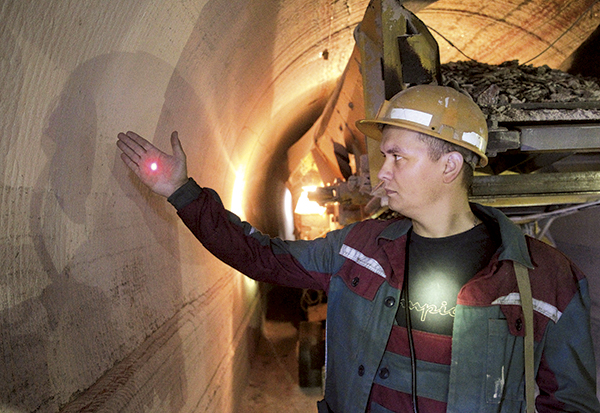
A shaft miner precisely lays tunnels with the help of a laser beam
The project is on a grand scale: it envisages the construction of a potassium chloride mining and processing plant (of 1.1-2m tonne annual capacity) on the foundations of the Starobinskoe potassium salt deposit. Speaking at the ceremony, the President pointed out that the opening of this new facility will make it possible to increase potassium production in the country to 14m tonnes a year. “Potassium fertilisers are major exports for our state; it’s an important source of foreign currency. Every year, we sell over 90 percent of all that we produce abroad,” said Mr. Lukashenko. “Belarus is among the few states which produces three basic types of fertilisers: potassium, nitrogen and phosphorous. This is an important task for all responsible global organisations — including the UN — as it helps to ensure enough food. At present, around 1bn people globally suffer from starvation. It’s impossible to feed them without agriculture, while the latter cannot exist without mineral fertilisers. With this in mind, the focus of our action is promising.”
We can say with pride that Belarus leads the world market in potassium production per capita. The focus of our chemical branch development is based on the reconstruction of existing production facilities and the construction of new plants. The Nezhinsky plant is the third of its kind and, according to the President, the Belaruskali plant (in Soligorsk) is currently undergoing modernisation. Moreover, a new facility is being built near Petrikov, which has been under construction for two years without the help of foreign investment.

Belaruskali Association’s Krasnoslobodsky mine
Mr. Lukashenko stressed that the launch of the Nezhinsky facility will result in an additional $860m of exports annually. Accordingly, tax revenues and fees will rise — a positive effect on the country’s economic situation. “As part of this plant’s construction, gas pipelines will be laid in 21 residential areas of the Lyuban District. In addition, a railway station will be built and 37km of railways. The Lyuban water abstraction and sewage facilities will be reconstructed. In the future, Lyuban will become an economically developed town resembling the mining capital of Soligorsk.” The president has asked the local authorities to prepare a plan of the town’s general development, taking into consideration the proposed changes. The plant will create at least 2,000 new jobs, enough for around 20 percent of the town’s population. “By the time the construction is finished in 4-5 years, Lyuban should have changed. We need to build accommodation and offices; around 1,500-2,000 new flats will be needed,” Mr. Lukashenko said, “This town should be the most modern, beautiful and functional in the area.”
The project, worth $1,66bn, is being realised using investments from the BIN Group — which injects $268m (or 15 percent of the total budget), while covering interests on the $400m+ credit. China’s participation is also envisaged. An agreement was recently signed with China’s Development Bank to open a credit line of $1.4bn (via Belarusbank) for 14 years, on 4 percent per annum interest. The Belarusian Government will act as a credit guarantee. Slavkali’s Head, Mikhail Gutseriev, explained how the facility would operate. The sales market is actually ready: potassium chloride can be sold to China independently or via the Belarusian Potassium Company. Clearly, the geography of sales would be much wider. According to Mr. Gutseriev, at current price levels, the Nezhinsky plant will pay for itself by 2030. By that time, the company will have paid around $8bn of taxes to the budget. Slavkali has enjoyed no special privileges in its bid, as Mr. Gutseriev noted, investors must keep competitive by working under the same conditions as their rivals.
Belarusian deposits of potassium salts are viewed as the most extensive on the planet. Three major mines are located in Belarus: Starobinskoe, Oktyabrskoe and Petrikovskoe. In the 1960s, deposits near Soligorsk were first mined and it was believed then that no less than 3.5bn of potassium salts were available. Since then, Belaruskali has produced around 1.4bn tonnes of potassium fertilisers but new mining technologies and additional geological studies lead us to believe that the true deposits are much larger. The Starobinskoe site has no less than 4.7bn tonnes of potassium and Petrikovskoe, which is only beginning to be worked, produces 1.9bn. It is clear that our mining companies have plenty of work until at least 2120.
By Alexander Benkovsky











